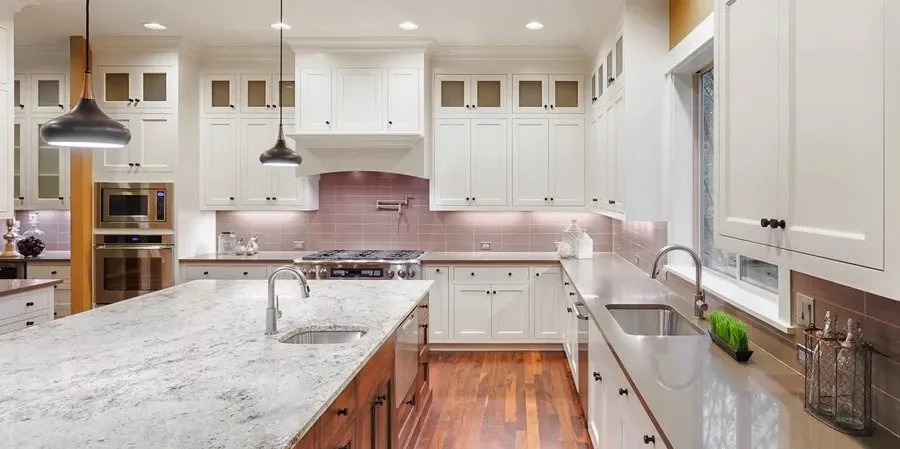One of the most exciting adventures of your life could be buying a new home. Just imagine how great it will feel to move your family into the home of their dreams. It can also be a daunting process if you’re not sure what to look for. You might find a house you really like, but how do you know what’s lying behind the freshly painted walls?
We’re here with a guide outlining some of the most important things to look for when shopping for your next home. You might be surprised at some of these simple tips to check before you sign the paperwork. Following our guidelines can give you peace of mind and eliminate that nagging buyer’s remorse.
What Are the Things to Look for When Buying a House?
Exterior Cracks
You might visit a house with your real estate agent and see a beautifully painted exterior from afar. But what exterior blemishes are there once you get closer? It is important to check the entire exterior of the home for large cracks or a crumbling foundation.
A few small cracks are likely okay because homes will settle into the foundation after being built. If you see an excessive amount of small cracks or large ones, though, then that may be a sign the foundation is not built up to code. You should also check every window and door by opening and closing them. A stuck window or door might mean that the house is sitting on uneven land or the ground has shifted.
History of Ownership
One of the most important things to check when buying a house is the ownership history. You can find this information online, at the county clerk’s office, or from your realtor. It is important to note how many owners the home has had over the years. If the house you are researching has had many different owners in a short period of time, it could be a sign of trouble. Why did the previous owners sell the house?
This can be similar to researching a person’s job history. If you see that a potential employee has had many jobs in a short time, then you might wonder why. We recommend asking the current seller their reasons for selling the house.
Water Damage and Leaks
One common problem that can plague a potential buyer is water damage or leaks, which are especially common in damp climates. The first place you should check is the basement. The basement, since it is underground, will be the first place water damage will be present. Excessive water damage or leaks can lead to mold growth and decaying walls.
One of the things to check when buying a house is fresh or bubbled paint. This might indicate that the seller is trying to hide something, like a patch of mold or damp areas. Be sure to look at the exterior of the house for signs of this. Take a walk around and see if there are downspouts that carry water away from the foundation. You can also check the exterior windows for soft spots, which could mean a window leak.
When it comes to the interior of the house, check for water rings on the ceiling. You should thoroughly inspect the plumbing, including the water heater, for rust spots. Those could be a sign of a previous pipe leak.
Uneven Floors
When viewing a house, always check for uneven, soft, or bouncy floors. One good way to do this is to bring a level with you to each viewing. You can place the level on the floors to identify if they are sloping excessively in one direction. This may be a sign of ground shifting or foundation damage.
It might sound crazy, but another way to check for uneven floors is to bring a marble with you. If you place the marble on the floor, and it rolls quickly in one direction, then the floors are definitely uneven. You can also identify uneven floors by seeing if any of the doors in the house stick when being opened or closed.

Permits for Home Improvements
This next step is critical for everyone shopping for a new home. You should ask the seller or your real estate agent to show you the work permits for all home improvements, even small ones. If a seller claims that they installed a new deck last year, then you should request to see the work permits.
If a seller gives some resistance in providing the documents, then it could mean the work was not done up to code. You might be surprised at the many home repairs or improvements that require a building permit. For example, installing or modifying a permanent heating or cooling system requires a work permit. Even putting in a new fence might require a building permit depending on where you live. If you do not have the permit documents, you might be fined in the future.
The Roof
Installing a new roof is a very expensive process. It is critical for potential home buyers to inspect the roof thoroughly before putting a down payment on a home. Having a new roof installed can cost thousands of dollars. In fact, it is one of the most expensive renovative improvements for a home.
Most shingle roofs last about 15 to 20 years. If you live in an area that is prone to heavy rain or inclement weather, then your roof’s lifespan might be even shorter. You should ask the seller if the roof has ever been repaired or replaced. If not, you should consider when you will need to hire a roofing company to take a look.
An important thing to check for is shingle curling or missing shingles. It might imply that the roof is leaking or damaged, and it could need to be repaired. Take a walk around the exterior house and check the area where the roof meets the exterior walls for cracks or water damage.
The Neighborhood
When buying a house, you should check more than just the physical house itself. We recommend checking the neighborhood out before making a purchase. This can also be quite an enjoyable process as well since you might get to meet the neighbors and get honest answers about the area.
Before you hit the streets and talk with neighbors, you should check out the available information online. You need to check home prices in the surrounding area to see if the seller is offering a reasonable price. You can check out crime statistics by looking at police reports, Uniform Crime Reports (UCR), and other online resources.
You should also check out the neighborhood at different times during both night and day. If you visit at night, you’ll be able to get a sense of nighttime activity, noise level, and street lights.
Mold Damage
Mold can be a major problem in some areas, and the last thing you want is to have it in your new home. It can cause sickness and severe allergies. One important thing to check when viewing a house is the basement and attic for mold spots. You should check under the sink and in the shower for moldy areas. We also recommend possibly checking behind wallpaper to see if the seller is trying to cover up mold damage.
You can also ask the seller if there has ever been mold remediation done on the home. If so, then it may be a sign that mold could be a recurring problem due to dampness in the home.

Storage Space
You never realize how much stuff you really have until you move. Before buying a new house, check that there is ample storage for you to store items that you don’t want to be seen all the time. Like, where will you put your vacuum or cleaning supplies? Where will you store children’s toys?
One area of particular concern is kitchen storage space. If you have a lot of pots and pans, then the kitchen in your new home should have plenty of cabinet space.
Proper Ventilation
It is important to check if the house has proper ventilation before moving in. If a house is properly ventilated, there will be less chance for mold growth, better indoor air quality, and no condensation issues.
When you are viewing a house, don’t be shy when it comes to opening windows throughout the home. We recommend opening windows and doors to see if there is a cross breeze throughout the house. You can also check the air filter for the AC unit. If it is filled with dust, then you might have a ventilation problem on your hands.
The Bottom Line
Looking for your dream home is never a straightforward process. There can be many bumps along the way. We put together this brief guide to give you the most important things to look for when viewing a house. While this is not a comprehensive guide, it will definitely give you the edge when shopping for a new home. Remember never to be afraid to ask the seller as many questions as you want, and having an experienced real estate agency by your side is the best way to ensure you buy the right house.

